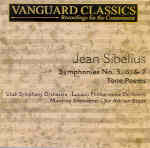These performances of Sibelius’ last three symphonies are a mixed bag, yet they have undeniable attractions. Maurice Abravanel manages a very satisfyingly heroic coda to the finale of the Fifth, but the ending of the same symphony’s first movement is undermined by timpani that seemingly get lost on the closing page. Here, as in the Sixth Symphony, Abravanel uncovers lots of interesting wind detail (the bass clarinet in the Sixth’s first movement, for example), and as with the first four symphonies the general balance between winds and strings is probably close to what the composer himself heard. Abravanel’s view of the Seventh also captures the music’s organic cohesion and organizes its various sectional tempo relationships as well as anyone, even if the trombones won’t win any awards for nobility of tone.
Disc 2 contains mono recordings (albeit in very good sound) with Adrian Boult leading a typically 1950s-sounding (that is, not particularly alluring) London Philharmonic. Still, it has to be said that Boult is a very capable Sibelian, particularly in Pohjola’s Daughter and Oceanides, both of which capture that special momentum that is the secret of effective performance of this music. There are too many wonderfully played performances of Tapiola, Finlandia, and the Swan of Tuonela for the scruffy playing of the London winds and strings to deserve any special attention from prospective purchasers, and Boult’s direct and honest view of Night Ride and Sunrise has been superceded by any number of more recent recordings. If you collect Abravanel’s Sibelius, then you will want this set as a matter of course; if you’re simply curious, try Volume 1 first.
































